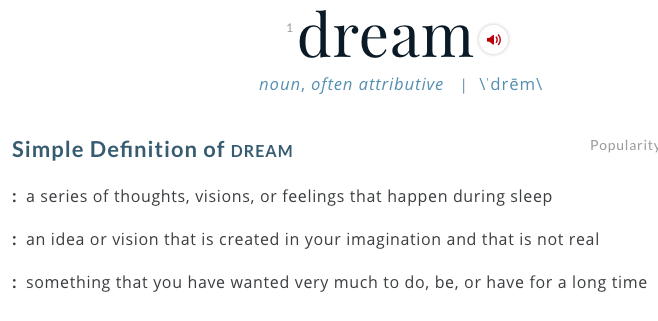
The Elusive Dream*
I’m currently at work writing a book about dreams, so the first task is to try to define my terms. What is a dream?
And before I even get to page one—I am stuck.
The dream itself is as elusive as a slippery fish you’re pursuing with your bare hands. Most mornings they slip free of your grasp before you even pick up your toothbrush to brush your teeth. Still more slip down the drain with soapsuds in the shower.
Just try to define them. They arrive in packages of image and emotion that deftly defy simple description. They are weightless but weighty. Can’t be measured, but some can’t be shaken off.
And don’t expect the dictionary to be of much help; on top of everything else, dreams seem to elude definition. Websters tells us they are “A series of thoughts, visions, or feelings experienced during sleep.” But that hardly captures the vivid cinematic nature of dreams that alternately mystify, entrance, captivate, frustrate, illuminate and confound those who recall them.
The word’s roots reach deep into history and wide into possibility. Dream’s etymology hints at a creation story that hops around from false visions true joy.
Perhaps the reason so many people are afraid of their dreams, is the root itself has scary beginnings. The Sanskrit root druh means to seek harm or to injure, which makes the dream seem like an inevitable nightmare. The Proto-Germanic origin is drachmas, meaning deception, illusion, or phantasm. Look to the Old Norse and find dream’s linguistic ancestor fraught, meaning a ghost or apparition—not exactly something you want to welcome into your bedroom at night with the lights out.
Science tells us a dream is mere mentation or a series of random neurochemical creations: They’re all in your head; just your imagination. In the Bible they’re prophecy—or possibly heresy. And to be dreamy is to be lazy, unfocused, just wasting your days.
Square all of this with dream’s alternate lineage: The Old English or the Old Saxon root drom, which grew up to be dream, is the distant relative of words like joy, mirth, and merriment.
Which brings me from the elusive to the effusive: In the dictionary of my personal history dreams are companions, teachers, gurus, and guides, they wake me up frightened or happy but over time their wisdom has given me courage, compassion, and a solid foundation for growth, discovery, connection, and creativity–not to mention whispered hints of destiny.
Like the dream itself that we look to for meaning (but receive so often instead meandering mystery) so too the drumbeat of a syllable Dream leads us on a labyrinthine (and amazing) journey.
Today’s post is in response to the Daily Prompt: Elusive.
